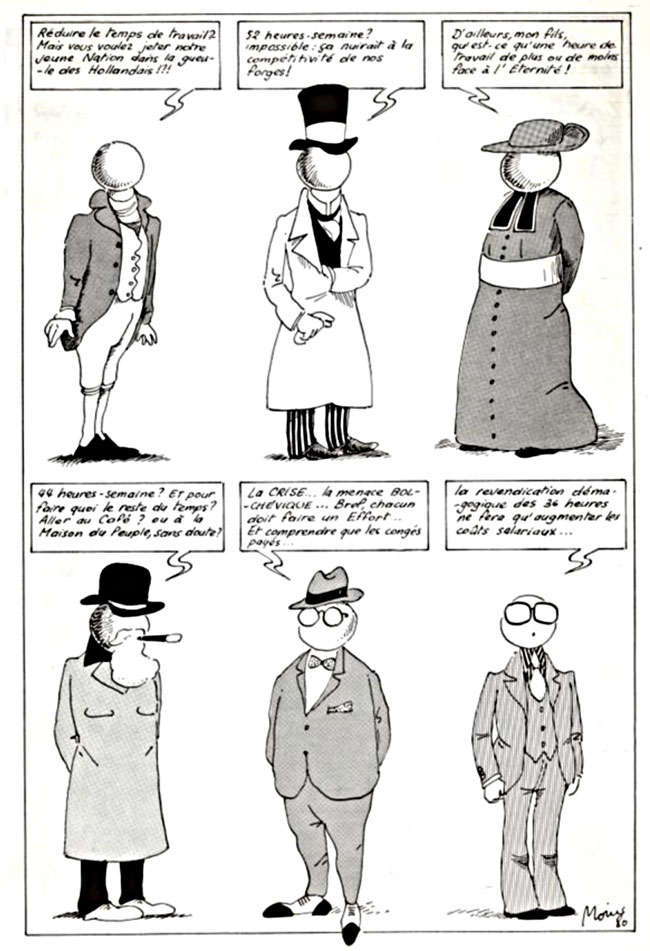Comic strip for Le Drapeau Rouge, 11 April 1979. A businessman tells protesters that they are "mortgaging the economic life of the country", while they confront him with the same complaint.
Philippe Moins is a Belgian animation expert and festival organizer, best known as founder of the annual animation festival Anima in Brussels. Earlier in life, he was also a cartoonist for the communist daily Le Drapeau Rouge.
Early life and cartooning career
Philippe Moins was born in 1956. Among his graphic influences were Charles M. Schulz' 'Peanuts', Robert Crumb, Picha and Roland Topor & René Laloux's animated film 'La Planète Sauvage' (1973). In 1979, he graduated in Philosophy and Literature at the Université Libre de Brussels and started his career making cartoons for Le Ligueur, the magazine of the Belgian "Family League" organization (Ligue des Familles). During the 1970s and 1980s, he frequently made editorial cartoons for the communist daily Le Drapeau Rouge, as well as the left-wing weekly Hebdo 77. Around the same time, he designed posters for political and cultural events, and drawings for the rock music magazines En Attendant and Rock This Town.
In 1980, on the occasion of the 150th anniversary of Belgium, Moins, Marcelle Lavachery and Jo Dustin initiated the satirical comics and cartoons publication '150 B'. Some of the pages also appeared in Le Drapeau Rouge. Oxygène published Moins' album 'Ciel! La Vérité...' ("Heaven! The Truth...", 1981), for which he won the Milou de Marbre ("Marble Snowy") in the category "amateur", during a comic festival in Liegè. Benoît Sokal won in the category "professional". Some pages had previously been printed in André Leborgne's monthly magazine Aïe!.
'Ca Bouge' and 'Bonjour Monsieur Gauguin'.
Animation expert
By late 1982, Moins eventually felt cartooning wasn't really his thing. He dropped most of his collaborations, although he continued to work for Le Ligueur. In the following decades, he established himself as an expert on the art of animation. He began an association with the animation studio Graphoui, through which he and Eric Dederen made the educational activity book for children 'Ça Bouge, Jeux Optiques et Film d'Animation' (Casterman, 1987), with fun tips and tricks for optical games and making animated films. The Dutch edition 'Poppetje Gezien? Kastje Dicht' was awarded with the "Vlag en Wimpel" prize. Also for Casterman, he illustrated the book 'Bonjour Monsieur Gauguin' (1989) by Michel Pierre.
In 1982, Moins also founded Anima, an annual animation festival still held in Brussels to this day. Moins was artistic advisor and frequent collaborator until 2015. He wrote numerous articles about animation for magazines, as well as several books: 'Les Maîtres de la Pâte' (Dreamland, 2001), 'Image par Image, le Cinéma d'Animation Wallonie Bruxelles' (CGRI, 2001), 'Voyage en Servaisgraphie' (about Raoul Servais, with Maurice Corbet, Éditions de l'Oeil/Musée d'Annecy, 2013), 'Le Cinéma d'Animation en Cent Films' (with Xavier Kawa Topor, Capricci, 2016), 'Raoul Servais Panoramic' (Borgerhoff & Lamberigts, 2018) and 'Stop Motion, Un Autre Cinéma d'Animation' (with Xavier Kawa Topor, Capricci, 2020). He also wrote a book about Anima itself: 'Anima à l'Affiche' (Lamiroy, 2019), with a preface by Hugues Dayez. The front cover was illustrated by Benoit Feroumont.
Teaching career
Since 2004, Philippe Moins has been a professor at the École Nationale Supérieure des Arts Visuels (roughly translated to the "Supreme National School for Visual Arts", ENSAV) in Brussels, better known as "La Cambre".
Graphic contributions
In 1986, Moins contributed to 'Pétition - À la Recherche d'Oesterheld et Tant d'Autres!', a collective book by Amnesty International that called attention to the mysterious disappearance of the leftist Argentinean scriptwriter Hector Germán Oesterheld.
Comic strip for '150 B', about the anniversary of Belgium in 1980. It depicts how throughout the country's history politicians, religious leaders and businesspeople have always resisted giving common workers benefits, like a shorter working week.






